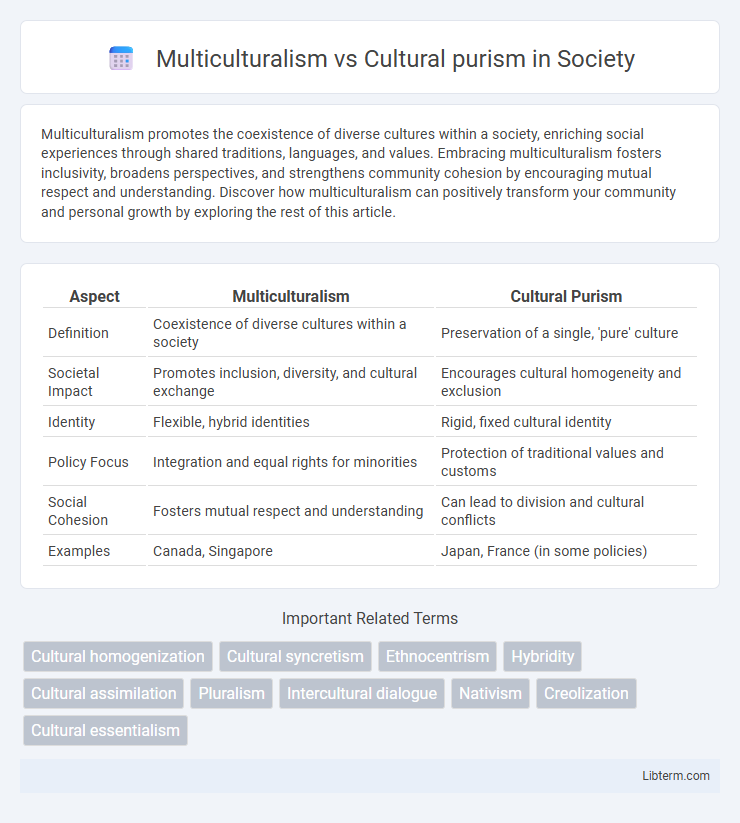Multiculturalism promotes the coexistence of diverse cultures within a society, enriching social experiences through shared traditions, languages, and values. Embracing multiculturalism fosters inclusivity, broadens perspectives, and strengthens community cohesion by encouraging mutual respect and understanding. Discover how multiculturalism can positively transform your community and personal growth by exploring the rest of this article.
Table of Comparison
| Aspect | Multiculturalism | Cultural Purism |
|---|---|---|
| Definition | Coexistence of diverse cultures within a society | Preservation of a single, 'pure' culture |
| Societal Impact | Promotes inclusion, diversity, and cultural exchange | Encourages cultural homogeneity and exclusion |
| Identity | Flexible, hybrid identities | Rigid, fixed cultural identity |
| Policy Focus | Integration and equal rights for minorities | Protection of traditional values and customs |
| Social Cohesion | Fosters mutual respect and understanding | Can lead to division and cultural conflicts |
| Examples | Canada, Singapore | Japan, France (in some policies) |
Introduction to Multiculturalism and Cultural Purism
Multiculturalism promotes the coexistence and mutual respect of diverse cultural identities within a shared society, emphasizing inclusivity and cross-cultural dialogue. Cultural purism advocates for the preservation of a singular, often traditional, cultural identity by resisting external influences and maintaining established customs and norms. Understanding these concepts is essential for addressing social integration, identity politics, and policy-making in increasingly diverse populations.
Defining Multiculturalism: Concepts and Principles
Multiculturalism promotes the coexistence of diverse cultural identities within a single society, emphasizing inclusion, equality, and mutual respect. It supports cultural pluralism, encouraging individuals to maintain and celebrate distinct cultural traditions while engaging in shared social frameworks. Core principles include recognition of cultural differences, anti-discrimination policies, and fostering intercultural dialogue for social cohesion.
Understanding Cultural Purism: Ideals and Motivations
Cultural purism emphasizes preserving the authenticity and integrity of a specific culture by resisting external influences and maintaining traditional values, customs, and languages. This ideal is often motivated by a desire to protect cultural identity from perceived dilution or loss in the face of globalization and multicultural interactions. Advocates argue that cultural purism safeguards heritage and fosters a strong sense of community and continuity across generations.
Historical Contexts: Multiculturalism vs Cultural Purism
Historical contexts reveal multiculturalism as a response to increasing global migration and the blending of diverse ethnic societies, promoting inclusivity and equal cultural representation. In contrast, cultural purism emerges from nationalist movements aiming to preserve a singular, often dominant, cultural identity against perceived external influences and cultural dilution. These opposing frameworks reflect broader social dynamics in nation-building, colonial legacies, and globalization, shaping contemporary debates on identity and integration.
Benefits of Embracing Multicultural Societies
Embracing multicultural societies fosters innovation by merging diverse perspectives, enhancing creativity, and driving economic growth through varied skill sets and global connections. Social cohesion strengthens as multiculturalism promotes tolerance, mutual respect, and reduces ethnic conflicts, creating inclusive communities. Educational systems benefit from cultural diversity by broadening students' worldviews and preparing them for global citizenship in an interconnected world.
Challenges and Critiques of Multiculturalism
Multiculturalism faces challenges such as fostering social cohesion and navigating conflicts between diverse cultural norms and values, which can lead to tensions within societies. Critics argue that it may promote cultural relativism, undermining shared national identity and common values. The balance between respecting cultural diversity and maintaining social unity remains a central debate in multicultural policies.
Arguments in Favor of Cultural Purism
Cultural purism advocates argue that preserving the original values, traditions, and languages of a society is essential to maintaining social cohesion and national identity. They claim that cultural purity prevents erosion of heritage and safeguards against the dilution caused by globalization or immigration. This perspective emphasizes strict cultural boundaries to protect a community's unique customs and historical continuity.
Impacts on Identity and Social Cohesion
Multiculturalism promotes social cohesion by fostering inclusive identities that celebrate diversity and encourage mutual respect among different cultural groups. In contrast, cultural purism often reinforces rigid boundaries, leading to exclusionary practices that can fragment social unity and intensify identity conflicts. Studies show that societies embracing multicultural policies tend to have higher levels of social trust and cross-cultural collaboration, while those adhering to cultural purism face challenges in integration and social harmony.
Case Studies: Successes and Failures Worldwide
Multiculturalism has shown success in countries like Canada and Australia, where inclusive policies have promoted social cohesion and economic growth through diversity. Conversely, cultural purism has led to social fragmentation and conflict in regions such as Myanmar and parts of the Middle East, where rigid cultural boundaries marginalize minority groups. Case studies reveal that embracing cultural diversity fosters innovation and stability, while cultural purism often results in exclusion and unrest.
The Future: Finding Balance Between Diversity and Cultural Integrity
The future of societal development hinges on finding a sustainable balance between multiculturalism and cultural purism, ensuring diverse communities thrive while preserving core cultural identities. Embracing multiculturalism encourages innovation and social cohesion by blending traditions, whereas cultural purism safeguards historical heritage and fosters a strong sense of belonging. Policy frameworks and education systems must prioritize inclusivity and respect for cultural distinctiveness to promote harmony and resilience in increasingly globalized societies.
Multiculturalism Infographic

 libterm.com
libterm.com